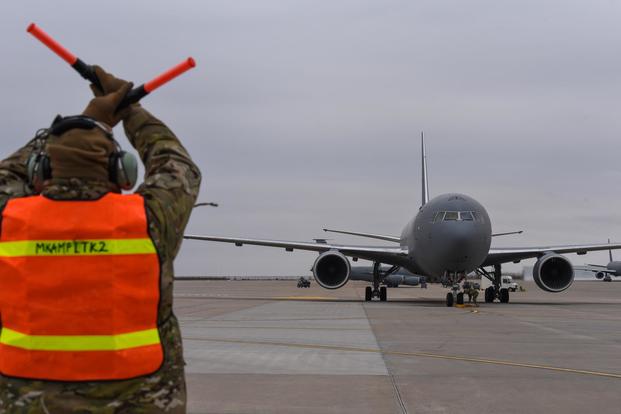It is "simply unacceptable" that trash, tools, nuts and bolts ended up scattered inside aircraft, which is why the Air Force will keep tabs on Boeing Co. as it again takes delivery of new KC-46 Pegasus tankers, the service's top acquisition official said Thursday.
"Debris translates into a safety issue," Dr. Will Roper, assistant secretary of the Air Force for acquisition, technology and logistics, told lawmakers Thursday during a House Armed Services Subcommittee on Seapower and Projection Forces hearing.
Last month, the Air Force stopped accepting deliveries of its new tanker over foreign object debris (FOD) problems only weeks after the first aircraft was transported from Boeing's Washington state facility to McConnell Air Force Base, Kansas.
The Seattle Times first reported that the debris led to a week-long grounding of the tankers and safety concerns from top service officials.
All aircraft under assembly are supposed to be swept routinely for debris. Loose objects are dangerous because they can cause damage over time.
Related content:
- Air Force Halts Delivery of New KC-46 Tankers over Debris Inside Aircraft
- KC-46 Tanker Problems Could Delay Retirement of Older KC-135s
- Will Ongoing KC-46 Tanker Problems Affect KC-10 Retirement
Roper, who visited Boeing's facilities in Washington state earlier this week, said he's satisfied with the company's containment plan going forward, which requires up to five sweeps of the aircraft to check for FOD.
But it shouldn't take sweeps to make a plane safe, he said. "They should be clean on delivery. If we don't see progress, we'll have to raise the stakes."
The Air Force received another Pegasus tanker from Boeing at Altus Air Force Base, Oklahoma, on Monday, nearly three weeks after the service stopped deliveries, Air Mobility Command spokeswoman Rose Riley said in a statement.
Roper told audiences Wednesday at the McAleese and Associates conference in Washington, D.C., that Boeing needs a culture change at its assembly-line facilities to improve their work.
"I have big concerns about the FOD issue because that's simply adherence to process," he told reporters after his speech at the conference. "It has nothing to do with design; it has nothing to do with production. It's simply following processes that Boeing has on the books, and having a culture all the way down to the mechanic level that embraces them."
Roper said he believes the company is improving, but he remains "concerned" and will be checking Boeing's progress for the foreseeable future.
"We're going to be measuring as we go, and we expect to see many months of pristine airplanes [before] we'll say the culture is back. So for the next year or so, we're going to be monitoring month by month, saying, 'Is it getting better?'" he said during his speech.
"I also left thinking Boeing understands they've got a severe situation that's going to take top-level engagement from their company," Roper added later. "They are committed to doing that."
The FOD issue arose as the Air Force grapples with other problems with the aircraft.
The service said in January said it would accept the tanker, based on the 767 airliner, despite the fact it has a number of deficiencies, mainly with its Remote Vision System.
The RVS, which is made by Rockwell Collins and permits the in-flight operator to view the refueling system below the tanker, has been subject to frequent software glitches. The first tankers were delivered despite that problem.
The systemic issue, which will require a software and hardware update, may take three to four years to fix.
Roper said Wednesday that Air Force engineers with the 711th Human Performance Wing at Wright-Patterson Air Force Base, Ohio, are testing technology solutions and imagery overlays that could help Boeing fix the visual interface.
-- Oriana Pawlyk can be reached at oriana.pawlyk@military.com. Follow her on Twitter at @Oriana0214.











